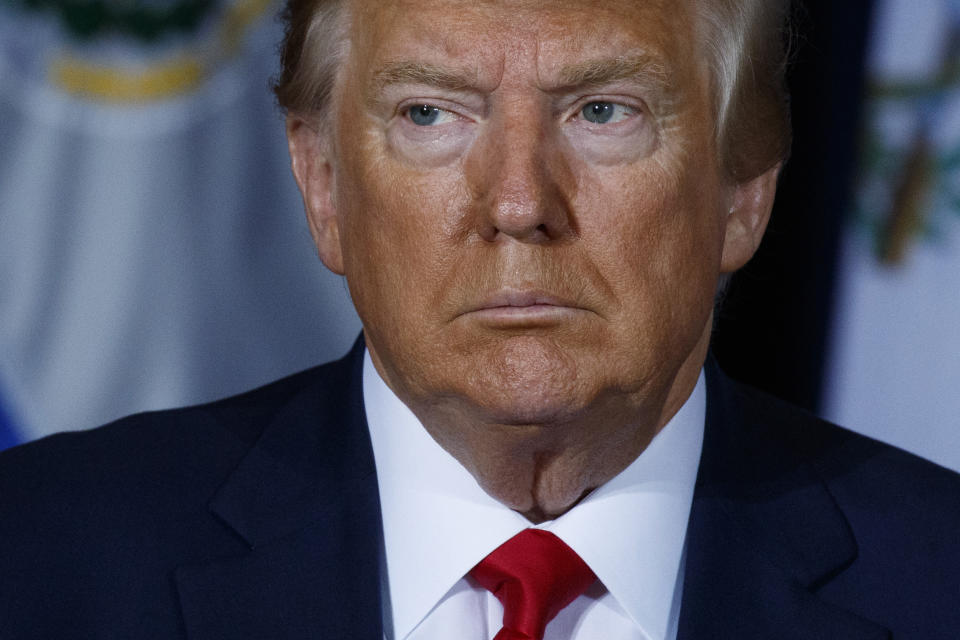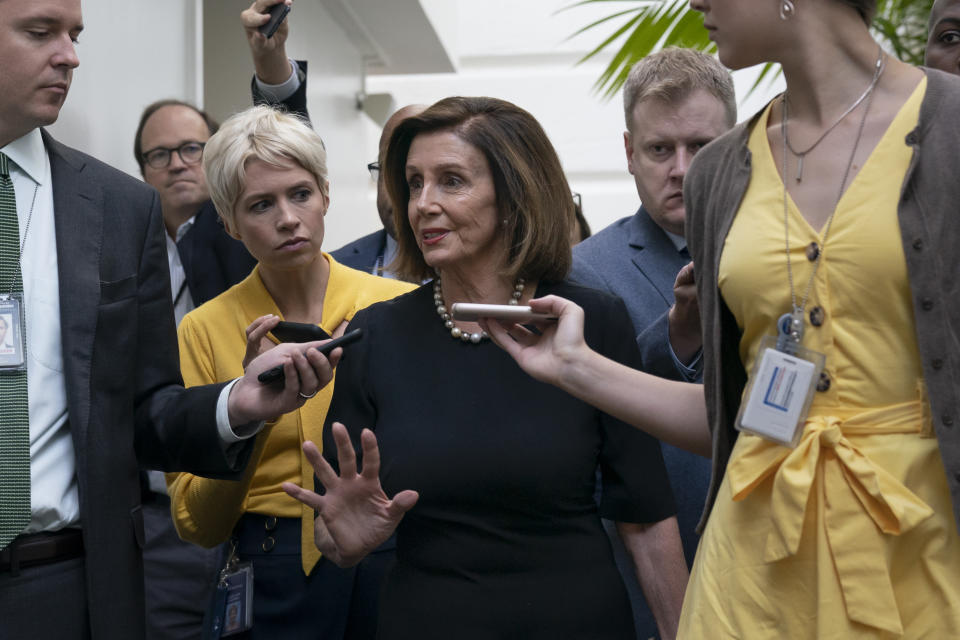Why Trump's 'no quid pro quo' defense still leaves him vulnerable
Even before House Speaker Nancy Pelosi announced Tuesday that Democrats were launching an impeachment inquiry based on allegations that President Trump pressured Ukrainian President Volodymyr Zelensky for help in his upcoming reelection campaign, the president was already laying out his defense. Between meetings with other world leaders at the United Nations General Assembly, Trump tweeted a denial of a theory that had made the rounds on Twitter and (liberal-leaning) cable news recently: that in his now infamous July 25 phone call with Zelensky, he had proposed a quid pro quo in the form of military aid for Ukraine in exchange for Zelensky opening a corruption investigation that Trump believes could prove embarrassing for a likely opponent, Joe Biden.

Biden’s son Hunter had served on the board of directors of a Ukrainian energy company that had been investigated by the top state prosecutor, a controversial politician widely considered corrupt by the U.S. and its allies. After the investigation had ended with no charges, Vice President Biden — representing the Obama administration, and in concert with other governments in Europe and elsewhere — publicly pressed for the prosecutor’s dismissal.
....You will see it was a very friendly and totally appropriate call. No pressure and, unlike Joe Biden and his son, NO quid pro quo! This is nothing more than a continuation of the Greatest and most Destructive Witch Hunt of all time!
— Donald J. Trump (@realDonaldTrump) September 24, 2019
There is nothing in the public record to suggest that Biden was advancing his son’s interests. Trump’s lawyer Rudy Giuliani has said he has such evidence, but has not disclosed it.
Earlier Tuesday, Trump’s favorite morning news show had also picked up on the quid pro quo framing.
“If the president said, you know, ‘I’ll give you the money but you’ve got to go investigate Joe Biden,’ that is really off-the-rails wrong,” “Fox & Friends” anchor Steve Doocy said. “But if it’s something else, you know it would be nice to know what it is.”
At issue was the revelation that Trump had withheld nearly $400 million in military aid for Ukraine just days ahead of his scheduled call with Zelensky. On Monday, Trump explained that his decision to delay that aid was based on his desire to make sure Ukraine’s new administration was honest. “If you don’t talk about corruption, why would you give money to a country that you think is corrupt?”
A day later, Trump gave a completely different, and contradictory, explanation, saying he withheld military aid because other nations weren’t also contributing.
“I want other countries to put up money, I think it’s unfair that we have put up the money,” Trump told reporters Tuesday at the U.N.
With House Democrats moving toward impeachment, Trump’s “no quid pro quo” defense was meant to guide his Republican allies and influence how the public viewed the facts about to emerge in the summary of his conversation with Zelensky and a complaint by a whistleblower in the intelligence community. Trump was laying down a marker that anything less than a direct offer of foreign aid in exchange for dirt on Biden proved his innocence.

Pelosi had a different standard in mind. In a meeting with Democratic House members just minutes before she announced her decision to begin impeachment proceedings, she issued a warning to her caucus.
“But the quid pro quo — don’t get caught in the trap of ‘Oh there is no quid pro quo,’” Pelosi said. “No, he asked for assistance from the foreign government. That’s wrong.”
Harvard law professor and frequent Trump critic Laurence Tribe came to the same conclusion.
If Trump was pressing Ukraine to go after Biden’s family at the same time that Trump was withholding aid from Ukraine to defend itself from Russian aggression, that’s enough. No explicit quid pro quo is needed to make this a betrayal of his oath and a “high Crime and Misdemeanor”
— Laurence Tribe (@tribelaw) September 22, 2019
The release of the summary of the call between the two leaders quoted Trump asking Zelensky to work with U.S. Attorney General William Barr to investigate Biden. In return for that promise, the transcript showed, Trump offered to meet with Zelensky at the White House.
Most Democrats in Congress saw the summary of the call as damning for the president.
The transcript of the call reads like a classic mob shakedown:
– We do a lot for Ukraine
– There’s not much reciprocity
– I have a favor to ask
– Investigate my opponent
– My people will be in touch
Nice country you got there.
It would be a shame if something happened to her.— Adam Schiff (@RepAdamSchiff) September 25, 2019
"I would like you to do us a favor...”
Folks, I am surprised the White House even released this transcript. It’s worse than we thought.
The President sought to use the powers of the United States government to investigate a political opponent.
We have no choice but to impeach. https://t.co/teZ8p83GXL— Alexandria Ocasio-Cortez (@AOC) September 25, 2019
Some Republicans, meanwhile, hewed to Trump’s line that only a literal quid pro quo would constitute a smoking gun for the inquiry.
Dems launched an impeachment inquiry based on a rumor instead of waiting for the facts.
It's now clear: there was no quid pro quo. @realDonaldTrump didn't break any laws.
But this has never been about facts or laws for Dems & the media—they just want to undo the 2016 election.— Steve Scalise (@SteveScalise) September 25, 2019
As the left now tries to move the goalposts, remember that for days, all we heard was that @realDonaldTrump offered quid pro quo to trade foreign aid in exchange for investigating the Bidens.
It was wrong. Again. Another day, another conspiracy theory debunked.— Mark Meadows (@RepMarkMeadows) September 25, 2019
In a Wednesday statement following the release of the summary of the call, Pelosi again made clear that the existence of an explicit quid pro quo was beside the point.
“It is not part of his job to use taxpayer money to shake down other countries for the benefit of his campaign,” she said in her statement. “Either the President does not know the weight of his words or he does not care about ethics or his constitutional responsibilities.”
With the start of the Democrats’ formal impeachment proceedings looming, the “no quid pro quo” defense is certain to be heard often in the coming days.
But back on Fox News, some commentators had already discarded the president’s framing.
“As most people know, it is a felony to ask for or to receive, to conspire and plan for, to attempt to acquire aid for a presidential campaign from a foreign government or a foreign national,” Judge Andrew Napolitano said Wednesday.
_____
Download the Yahoo News app to customize your experience.
Read more from Yahoo News:
Kavanaugh book authors: 2020 Democrats had a ‘rush to judgment’ on impeachment after NYT op-ed
Russia carried out a ‘stunning’ breach of FBI communications system
Court revives suit alleging Fox News inflicted ‘emotional torture’ on Seth Rich family
After hours of questioning Lewandowski, Democrats finally land punches
PHOTOS: Scientists race to read Austria’s melting climate archive



